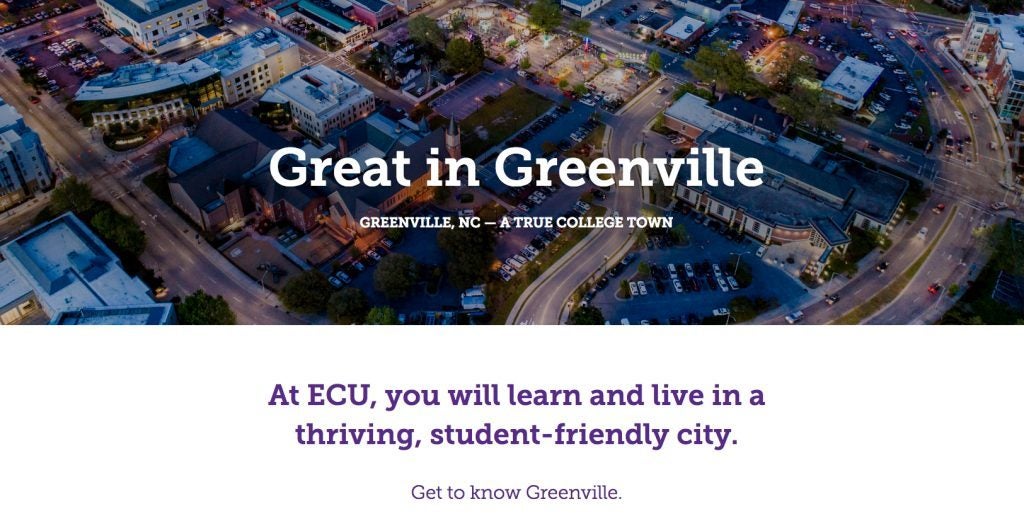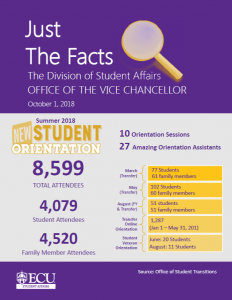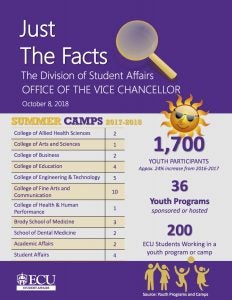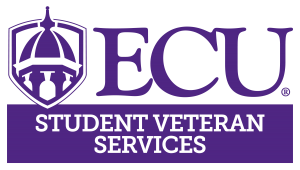October 15, 2018 Edition
Inside the Edition
Jump to story by clicking links below
Uptown Greenville Needs Assessment
6th Annual Student Success Conference – Call for Proposals
SkyFactor Survey for Campus Living
Collegiate Challenge to Address Hunger
RSVP to Join Us in Honoring Our Women Veterans
Give to Student Affairs
Uptown Greenville Needs Assessment
ECU’s Division of Student Affairs is working closely with Uptown Greenville to better understand the connection between Pirate Nation and our local businesses near campus. This survey will take about 10 minutes to complete. There are questions related to Uptown Greenville’s offerings related to entertainment, food, bars, and shops. You can share what you like about Uptown as well as offer suggestions to improve the experience. Please click here to take the survey.
Incentives: Everyone who completes this survey will be entered into a random drawing for up to three chances to win $100 to any single Uptown Greenville establishment of your choice. In addition, there will be one guaranteed student winner, one guaranteed faculty or staff winner, and one guaranteed winner from the newsletter drawing.
What is Uptown Greenville? Sometimes referred to as downtown, Uptown Greenville is the entertainment and retail space adjacent to ECU with a multitude of shops, bars, restaurants, and other venues. Uptown Greenville is loosely bounded by the Town Commons and the Tar River on the north, S. Jarvis Street on the east, 10th Street on the south, and Albermarle Avenue on the west. For a visual view, please visit this interactive online map of the various establishments in Uptown Greenville.
Thank you for your participation. Prize winners will be notified Friday, November 2nd.
Focused.Motivated.Engaged. – A Journey Toward Student Success
The divisions of Academic and Student Affairs are excited to announce the 6th Annual Student Success Conference at East Carolina University on Friday, January 25, 2019 in the new Main Student Center. The 2019 conference theme is “Focused. Motivated. Engaged. – A Journey Toward Student Success.”
The purpose of the conference is to promote a sense of community among faculty and staff that leads to opportunities for student success strategies for all students. This conference is designed to share, discuss and analyze strategies related to how students change and how they can build a plan for success.
Conference Goals and Objectives:
- Learn how campus communities can use the design process to assist students in building a life in which they can thrive
- Become better informed about the learning environment for students
- Broaden campus conversations about strategies and information related to community support and student success
- Learn about advancement, involvement, barriers and performance of students in college
Submissions for traditional presentations are invited on topics related to strategies for how students change and how they can build a plan for success.
- Presentation (50 minutes)
- Roundtable Discussion (50 minutes)
- Panel Presentation (50 minutes)
The deadline for program submission is November 15, 2018. Click here to submit a proposal.
Additional conference information can be found on the Student Success Conference website: https://studentaffairs.ecu.edu/studentsuccessconference/
“A Labor of Love” – Building ECU’s new student center at your Alma Mater, an extra special project
Written by Erin Shaw, University Communications
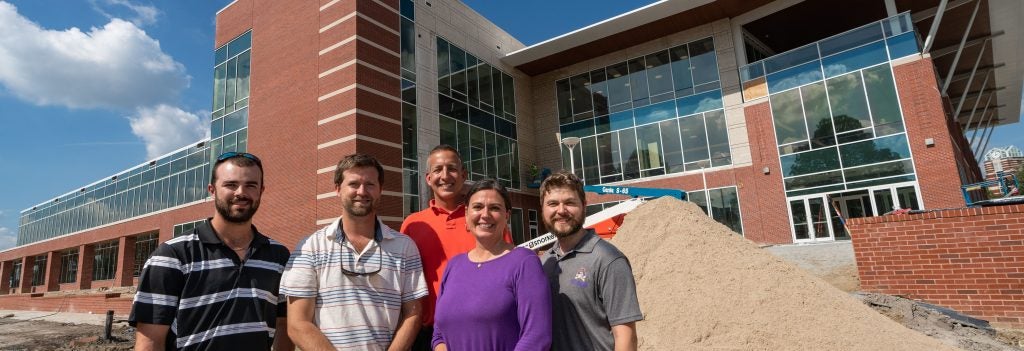
Tom Daniel has been working in construction for decades, but his latest project is by far the closest to his heart. Daniel, a ’92 and ’11 alumnus, is a senior project manager for the new Main Campus Student Center, a state-of-the-art building with enough bells and whistles that many are calling it the future “front door,” “gem” and “pride” of ECU.
Opening in January 2019, the 210,000-square-foot student center is double the size of Mendenhall, the current student center that was built in 1974. The new building is silver-level LEED certified with six dining options, a grand ballroom capable of seating 1,800 people, a jumbo outdoor movie screen and 12-foot-tall acrylic purple letters that spell out “Aarrgh!” And those are just a few of the features.
“This is 180 degrees from Mendenhall,” Daniel said. “I’m real proud of being a part of it.”
The new student center and adjoining 700-space parking deck is a joint venture between T.A. Loving and Barnhill Contracting companies, together employing approximately 60 ECU alumni, many of them construction management graduates.
Daniel was one of the first graduates of ECU’s construction management master’s program. His wife, Denise, also graduated from ECU and his son, Jonathan, is a current student.
“We’re constructing something that my son can immediately enjoy. I can’t even begin to put into words to how much it means to me,” Daniel said.
Click here for the complete story.
Using a Benchmark Survey to Inform Campus Living Decisions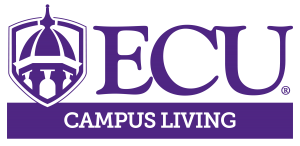
Submitted by Linda Campion, Ph.D. (SAARP) and Mike Perry (Campus Living)
The Division of Student Affairs has moved from learning about assessment to acting on our data. Being able to provide detailed rationale for changes and modifications in our current programs or for designing and implementing new programs are just a couple of benefits of attending to an assessment plan.
Campus Living has been collecting residential life data through the SkyFactor Benchmarking Survey (previously EBI) since 2004. The results have supported changes in facilities, customer service policies/trainings, Resident Advisor trainings, campus safety improvements and, most recently, the academic success of our residents.
SkyFactor is designed to measure ‘satisfaction’ of our respondents with many factors; examples include hall/apartment programming, environment, facilities, services provided. The questions also get specific gauging satisfaction of room assignment, room change, and roommates. In total, 21 factors are measured. Additionally, we develop and include 10-20 institution-specific questions, depending on the distribution method.
At ECU, SkyFactor is conducted on an every other year basis to every student residing in our residence halls. A distribution plan is established in order to assure the best possible response rate. Incentives are provided for both random participants and the floors with the highest response rates. In fall 2017, SkyFactor was distributed to 5,593 residents; 3,091 responded for a 55.3% response rate. This high number of responses offers Campus Living a rich dataset of information.
Following the data analysis, three recommendations were made and to date, we’ve developed processes and/or programs to impact two of these three areas.
Recommendation 1) From an Overall Satisfaction standpoint, if we further assisted our residents in meeting other people, living cooperatively, resolving conflict, and improving their interpersonal relationships, we would see the greatest impact overall. Here’s what Campus Living did:
Roommate Conflicts
- Revamped the way we approach roommate conflicts to assist residents in gaining experience in conflict management.
- If a conflict arises, we use the roommate agreement as a mediation tool and, where necessary, it is re-written to assist the roommates in working through their conflict to a solution.
Recommendation 2) From a Learning standpoint, if we further assisted our residents in balancing their social, work, and academic commitments, managing their time, living a healthy life, and managing their money, we would see the greatest increase in learning. Here’s what Campus Living did:
Starfish Early Alert System
- Use of Starfish early alert warning system with ‘flags’ and ‘kudos’ to support resident academic success.
- When a resident receives one or two flags, we contact that student by email, normalizing their struggle and inviting them to share an update with us about that situation by replying to the email inquiry. Once that response is received, we evaluate that individual student’s needs and help connect them to the necessary resources fostering their success.
- If a resident receives three active flags, they receive the same email, but we go one step further and provide a printed letter which is hand delivered to their room by their RA. The letter asks them to provide an update (via email) regarding the situation and to provide times they are available to meet with a Campus Living staff member to have a holistic conversation regarding their experience at ECU.
Study Groups
- Collaborated with the Pirate Academic Success Center (PASC), Campus Living initiated Study Groups on College Hill. In spring 2018, this initiative resulted in 404 contacts with residents who joined these study groups.
Class Connections
- This new initiative allows us to bring together students who reside near one another and are also enrolled in common courses, creating informal study groups. As those study groups begin, they reach out to our office ahead of their group meetings and we provide them with study session fuel (snacks).
At-a-Glance Semester Snapshot
- Created an At-a-Glance tool providing all residents with a snapshot of their semester. The resulting snapshot allows them to plan ahead noticing weeks that might be heavy with group projects, exams, papers, and finals. RAs will participate in this initiative by holding kick-off events and tracking of members within their communities completing these at a glance sheets.
Campus Living utilizes the valuable data provided by our residents in the SkyFactor survey in order to make decisions that impact not only their satisfaction with our university, but also impacts their sense of belonging and their ability to learn.
Need assistance putting your data analysis into action steps? Contact your assessment liaison today!
Student Media’s Hurricane Florence Coverage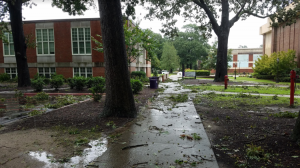
Written by Trish Willis, Editor-in-Chief of The Hook Magazine
Social media has a way of keeping everyone connected at all times, no matter the distance. Though it can be used for trivial jokes and casual conversations, platforms such as Twitter and The East Carolinian’s own website acted as key sources of information for students and faculty this past month.
On Sept. 10, East Carolina University issued an alert cancelling classes for the following day and until further notice due to the approaching category 4 Hurricane Florence.
With that in mind many students, faculty and local Greenville residents rushed to the stores to stock up on groceries, while others hit the road to evacuate.
In spite of the cautionary news reports and panicked conversations, several dedicated members of The East Carolinian (TEC) stayed behind to bring students far and wide updates of their beloved city.
TEC’s Editor-in-Chief Matthew Prensky stayed in Greenville during the storm accompanied by a few other reporters. Prensky says it is his job and duty of the newspaper to report what is happening at ECU.
“For a major weather event such as a hurricane, people want to know what’s going on,” Prensky said. “It’s important to show and tell people what’s happening to their homes or university.”
Prensky said that during the storm and after it had passed, it seemed to him as though a lot of the coverage by Greenville stations was focused outside of the city limits.
“In my opinion, this created an information gap where people concerned about Greenville weren’t getting served,” Prensky said. “TEC helped fill that gap.”
TEC’s Visual Arts Editor Thomas Weybrecht took to the streets in the midst of what he said was heavy winds and non-stop rain to capture the moments of the storm.
Weybrecht said he took pictures of boarded shops, the rising river and more to make sure students had a visual representation of the damages.
Bianca White, a junior Biology major, gives thanks to the staff members of TEC for their efforts during Hurricane Florence, as she looked to TEC to stay up to date on ECU’s condition and decide if it was safe to head back to school.
“My neighborhood in Fayetteville flooded severely and we lost power in my home for several days,” White said. “I used the battery power I had left on my phone to constantly check The East Carolinian’s website and twitter page. I knew they were posting reliable updates.”
White also said when she finally regained power in her home, the first thing she did was charge her laptop and read any new TEC articles she could find.
“When you’re living in an area that’s affected, you want to have some hope that your second home is still OK,” White said. “I’m glad the newspaper didn’t stop giving us that hope.”
White said she felt grateful for the coverage, even calling it a beacon of hope. But for Prensky, it was another day in the office.
“I’d like to think all the reporting TEC did helped keep people safe and give some peace of mind knowing the university wasn’t too severely damaged,” Prensky said. “More than that, I was just doing my job.”
Greek Life Brotherhood/Sisterhood Assessment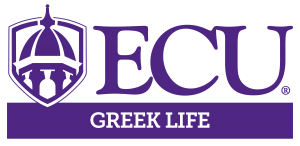
Submitted by Melissa Allay (SAARP), John Mountz (Greek Life) and Jessie Ashton (Greek Life)
Greek Life implemented the Brotherhood/Sisterhood Assessment in the spring of 2018 in collaboration with Dyad Strategies, a consulting firm that specializes in fraternity and sorority issues. The Greek Life Dyad consisted of two pieces: 1) Implementation of the l Brother/Sisterhood Assessment, and 2) Campus Consultation. The assessment was sent out via email in February 2018 to over 3,000 Greek Life members to measure student attitudes related to brotherhood/sisterhood, hazing and accountability. After the results were collected and analyzed the Dyad team presented the findings to various audiences and provided an overview of student perspectives. A consultant from Dyad Strategies, Dr. Gentry McCreary also met with a group of organizations one on one for a more qualitative assessment and coaching of students.
After the assessments were completed, the Greek Life team took the summary of results into consideration when approaching the upcoming 2018-2019 academic year. From their review, there were a variety of areas of improvement for Greek Life staff to focus on with four areas emerging from the data for fall 2018:
IFC Recruitment: Through the assessment, room for improvement for the way IFC organizations recruit members was considered. Fall 2018 recruitment was re-evaluated and changes were made based on the data.
Actions Taken
- Greek Life staff encouraged IFC to focus on recruiting males that fit their chapter’s values and expectations rather than trying to alter their new members to “fit in” through hazing activity.
- To ensure enough time for new members and chapters to get to know one another, IFC recruitment was extended. In the Spring, it will be shortened a bit, but will occur later in the semester to allow more time for informal get-to-know-you opportunities.
- Alcohol at recruitment events has always been a concern and contributor to potentially harmful behaviors. IFC took action to ensure alcohol was not present at recruitment events this semester in a more intentional way than in previous semesters..
Hazing Programming: From the data, it was found that anti-hazing programming needed to be more robust, targeted, and go beyond passive programming and large-scale speakers.
Actions Taken
- The Greek Life staff worked with council leadership to create programming that was more interactive and student directed to encourage alternatives to hazing and candid conversations about the harm hazing may cause.
- One of the programs created had students lead dialogues on how hazing is portrayed in the media. This program was put on with collaboration with club sports and athletics. Peer to peer programming allowed students to relate to one another and acknowledge the problems organizations have with hazing at ECU
- Due to Hurricane Florence, the National Hazing Prevention Week Speaker, Michelle Guobadia has been rescheduled to November 4th.
- Last, Greek Life is working to implement more bystander intervention trainings. These trainings will target care and empathy for brothers/sisters in order to encourage students to intervene out of care rather than obligation towards their brothers/sisters.
Student Conversations: The data showed that there was a connection between vulnerability and belonging in ECU’s Greek Life chapters. Belonging is shown to be one of the highest predictors of chapter success, retention, and engagement post-graduation. Because of this, the Greek Life team wants to increase opportunities for vulnerability within the chapters’ new member processes.
Actions Taken
- Greek Life staff have developed self-guided group conversations during standard leadership trainings and programming, like the recruitment counselor retreat. The professional staff do not participate in these conversations so the discussion is not impacted by their presence.
- Organizations are encouraged to bring these vulnerability exercises back to their chapters outside of leadership training and programming.
- Greek Life will also host programming targeted specifically at New Member Educators in the Spring.
Staff Meeting Discussions: As a way of continuous improvement, the Greek Life staff review four individual groups’ Dyad data weekly. This creates an opportunity to discuss what the data means pairing it with information they may already know from advising those groups.
Actions Taken
- From these discussions, they determine potential programs for groups to support them with things they may be struggling with or highlight things they are already doing well. For instance, capitalizing on data that shows a sorority has a strong sisterhood to ensure the sorority knows what they are doing right and how they can improve.
With these four actions taken, it is important to note that Greek Life is in the beginning stages of the continuous improvement based on their Dyad Strategies data. They are continuing to review the data on each of their chapters while assessing the programs and events they are implementing to determine the effectiveness of each of their new initiatives.
ECU one of 18 campuses partnering to address food insecurity in NC
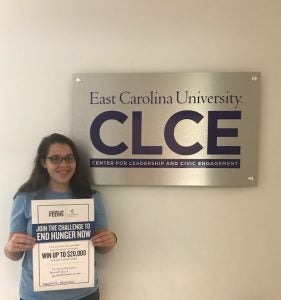 North Carolina Campus Compact has joined forces with Food Lion Feeds to launch a “Collegiate Challenge” that will mobilize colleges and universities to address hunger in their local communities.
North Carolina Campus Compact has joined forces with Food Lion Feeds to launch a “Collegiate Challenge” that will mobilize colleges and universities to address hunger in their local communities.
East Carolina University is among a group of 18 geographically diverse schools — including 4-year colleges and universities and 2-year community colleges — that will host events to raise awareness about hunger in partnership with their local food banks, on-campus pantries and local Food Lion stores.
Winning schools can receive $10,000 for the most engagement and creativity on campus, and a second award of $10,000 will be awarded for the campus that collects the most food – adjusted for school size – in a food drive. The prize funds will support hunger-related initiatives; ECU plans to use the funds to support the Purple Pantry, an on-campus initiative tackling food insecurity among the student population. The Collegiate Challenge began in September and runs through December.
“We are excited to partner with N.C. Campus Compact and these 18 campuses that are already doing so much around food insecurity,” said Pat Taft, community relations manager for Food Lion. “It is a natural fit for us because we are passionate about feeding our neighbors who shop with us and those who may have the difficult task of choosing between rent and gas and groceries. We want to encourage the great work these students are already doing and by supporting their efforts we can broaden the reach of our hunger relief efforts in the towns and cities we serve.”
ECU has selected Hannah Grant, a senior studying social work, to lead the campaign. Grant was selected because of her passion to address hunger and her work this past summer with the Collegiate Recovery Community’s Purple Pantry on campus. Through this experience, she saw firsthand how food insecurity affects the students at ECU and how it, in turn, affects the whole community. The faculty/staff mentor is Nichelle Shuck, associate director in the Center for Leadership and Civic Engagement.
For more information contact Hannah Grant at granth15@students.ecu.edu or follow on social media at @ECUCLCE or #FoodLionFeeds.
Just the Facts – New Student Orientation and Summer Camps
Click on the image(s) to view in a larger format.
Just the Facts is a regular communication from the Division of Student Affairs Office of the Vice Chancellor highlighting some of the amazing things happening in our area in a quick, simple, and easy-to-read manner. What we do as SA educators and staff members demonstrates our commitment to student success, public service and regional transformation.
Has something exciting happened in your area within the past few weeks? Send the fact to VCSA@ecu.edu, subject line: Just the Facts and we will include in the next edition.
November 6, 2018
12:00pm – 1:30pm
The Croatan Green Room
Student Veteran Services (SVS) is pleased to announce the creation of an ECU Women’s Veteran Group for female students, faculty and staff military veterans. The purpose of this group is to provide a positive space for navigating the transition to the civilian world; offer connections to important resources; to provide the opportunity to support and networking among women veterans; and to honor service to country. The group plans to meet quarterly during an academic year.
We invite our ECU women veterans to the 2nd Annual Women’s Veteran Luncheon to acknowledge the service of the often forgotten population who serve in the U.S military—women. Currently ECU employs 554 women veterans who served or are serving in the U.S military and this luncheon is an opportunity to celebrate their service, along with the service of our many women student veterans.
According to 2013 statistics, women made up 14.6% of the total military membership and there were more than 1.8 million women veterans (National Veterans Foundation). We know that women veterans are often referred to as “an invisible population” for several reasons – their transition from military to civilian life is often very different than the male veterans; they do not seek services as soon as they are needed; and there are few services available that are specific to women veterans and/or women veterans with children.
ECU Student Veteran Services and the Office of Student Transitions are proud to support ECU Women Veterans.
Join us in honoring our women veterans past and present. The event will be capped at 90. In order to include our student women veterans, the first 60 faculty/staff women veterans should RSVP to Lisa Brown at brownli@ecu.edu.
The deadline for registration is Thursday, October 22, 2018.
